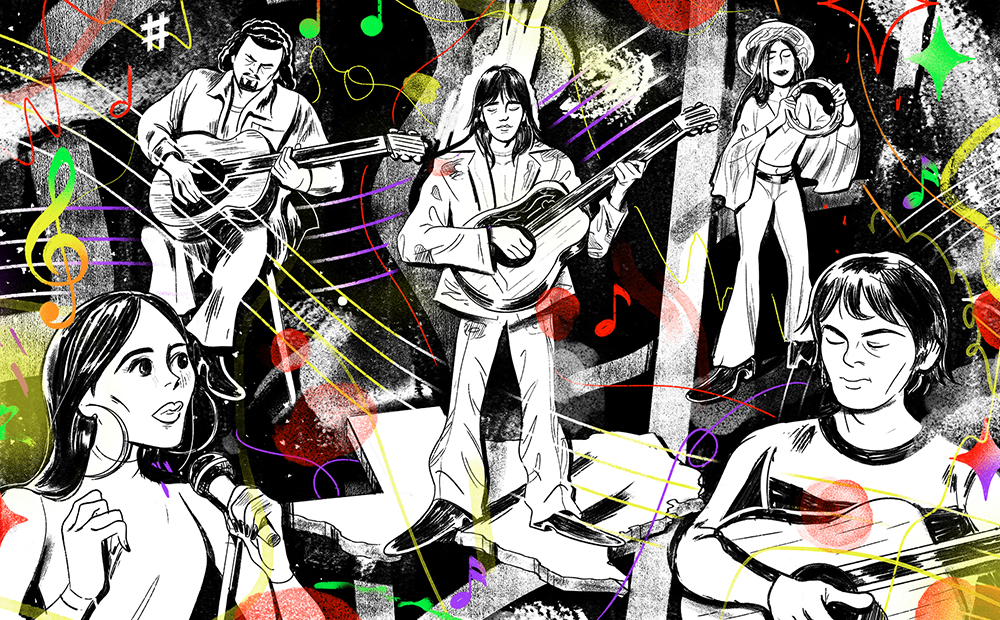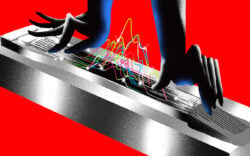Illustration: Jackie Ferrentino
From living in Austin, Texas and working in its music community for two years, I’ve learned that cosmic country is a term that can raise eyebrows, get passionate fans going, or spark intense industry debate.
‘Cosmic country’ or ‘cosmic Americana’ came into the collective consciousness in the 1960s and continues to exist, evolve, and influence other styles of music. In addition to its intriguing history, the story of cosmic country music demonstrates how categorical genres can either create a movement or be exploited as a press stunt—neither of which needs to be exclusively portrayed as right or wrong. It also shows the lasting impact instrumental and songwriting experimentation can have on a genre (country music in this case) and how a niche music style can maintain a community around it for decades. Read on to learn more.
What is cosmic country music?
Cosmic American music (sometimes referred to as “cosmic country”) is a term popularly attributed to Gram Parsons in late 1960s southern California. It’s a musical genre that merges psychedelic and exploratory music with traditional American roots music, similar to how psychedelic cumbia was developed in Peru and Colombia.
That definition varies depending on who you’re asking, as subjectivity clouds any debate over music. To either clear things up or confuse you further, No Depression has a list of what cosmic country is not (i.e. outlaw, pure country, country rock, and usually not singer / songwriter).
The origins of cosmic American music
Gram Parsons was on a mission to reclaim an experimental streak rejected by traditionalists in Nashville by creating American music distinct from what he called the “plastic dry f***” of country-rock,” according to The Guardian. His vision revolutionized country, leading to the catch-all subgenre—or movement—known as “alt-country.”
The pioneers of the genre were The Byrds, Flying Burrito Brothers, Emmylou Harris, Lovin’ Spoonful (depending on who you ask), and Doug Sahm. You can also trace this style of music from bands like the Grateful Dead, Los Lobos, Wilco, and Yo La Tengo to even more contemporary acts like Steve Gunn, William Tyler, Le Ren, Joan Shelly, and Margo Price. Many of these groups pull inspiration from acts like Sun Ra—a solid illustration of how they’re attempting to incorporate experimental / avant-garde stylings into commercially accessible music, all while trying to stay true to themselves.
San Antonio, TX-based musician Garrett T. Capps characterizes cosmic country as “a blend of American roots music and progressive psychedelic rock. As in, progressing rock and roll via psychedelic sounds and experiences.” He adds, “Michael Martin Murphey, who performed alongside Jerry Jeff Walker and in The Lost Gonzo Band, was a staple at the Armadillo World Headquarters [in Austin, TX] and had a song called ‘Cosmic Cowboy, Pt. 1.’ It’s kind of corny, but that’s a good example of how the countercultural movement of the ‘60s around The Byrds and Parsons made its way from California to Texas and took hold here.”
In terms of instrumentation and processing, Capps shares, “It’s not uncommon for cosmic country to sort of revolve around the steel guitar with lots of delay and reverb on. I think spacey steel and lyrics about being high are probably the elements of the most stereotypical cosmic country of the modern day.”
The debate and the bridge
In the alt-country world, there’s plenty of debate around what should and shouldn’t be considered cosmic country. Every so often, the term re-emerges in the mainstream music journalism canon, sparking much debate. But, the truth is that these conversations help keep the tradition of cosmic country alive, even if there’s some misclassification taking place. There are also the artists who really ride the comic country wave in their branding, also sparking debate and keeping the term fresh in the collective alt-country mindset.
Musician Daniel Donato recently released an album titled Cosmic Country & Western Songs with a whole cosmic country brand around it. He dominates the first page of Google’s “cosmic country” search results. Capps comments, “Daniel Donato is an amazing guitarist, like one of the best (or he will be) because he’s young and ready to rip. He’s got world-class chops and the potential to do something truly original. But that’s a perfect example of the Nashville machine recognizing his talent and feeling like they have to put a brand on it to get his name out there—so they manufactured the cosmic country thing. At least, I assume that’s what’s happening. I really don’t know. It could have been his idea.”
Capps’ music is also often categorized as cosmic country, space country, or cowboy kraut. He explained, “I got pretty into krautrock—the motorik beat and the bands NEU! and Stereolab. I was getting into that stuff, but I can’t really shake the Texas songwriter outta me—that’s just the type of artist I am. Around that time, I met my bandmates Justin Boyd and Torin Metz, who are sound designers and psychedelic / experimental musicians. That combination of my Texas roots and their sound explorations makes our music psychedelic and cosmic, I guess. Ironically, as we were doing that, Sturgill Simpon’s popularity began to rise, who is cited as the king of cosmic country. My band and I don’t find his music to be that psychedelic or cosmic, but it seemed like someone decided to give him that label and it created some fresh buzz around the genre, making it accessible to people who thought they didn’t like country music. That’s probably the neatest thing about this style of music; it’s building a bridge for people who were never into country before.”
The subgenre that never fades
One may assume that cosmic country would have its heyday and fade out— be a quick-burn fad—but that hasn’t been the case. Popularized by Parsons in the ‘60s, cosmic country has maintained its relevancy through today.
Cosmic country albums are made and released all the time. Certain elements have a timeless quality to them. For one, these songs, especially when performed live, often include pedal steel, an instrument that has made its way back into the mainstream across genres and styles of music. The lyrical content often drips with a certain level of timeless existentialism that hits hard these days. As quoted in The Guardian‘s article, “[Parsons’] songs are so big and unspooling, and contain a distinctly American kind of yearning—hunger for the next frontier, and for the ways in which it can remake you,” says Amanda Petrusich, the author of Do Not Sell at Any Price, about obsessive 78 rpm collectors. “I think there’s a kind of searching inherent to it, and I hear that in these newer artists, too.”
There’s often a leader (or a group of leaders) holding the torch, keeping the genre alive. Capps shares, “The 1970s Austin scene embraced the cosmic country scene. I think Texas natives like Doug Sahm hung out with people like Graham Parsons in California, and then brought that style back here. Doug would put people like Jerry Garcia, Willie Nelson, Leon Russell, and members of the 13th Floor Elevators on stage together. Members of the Dead and super well-known Austin musicians all jammed at the Armadillo World Headquarters on the fly on Thanksgiving one year because Doug organized it. It was one of the most legendary Austin concerts of all time. I try to do that here in San Antonio on a different scale; I try to put musicians you maybe wouldn’t expect on stage together and see what happens—a classic conjunto player with a rock band, for example.”
The musician Doug Sahm reinvented himself and his career several times over. His final act was the Texas Tornadoes. Capps continues, “All those guys had their big second or third act in their careers. Texas Tornadoes were all these middle-aged legend types who all of a sudden were popular again with their supergroup. You’d hear ‘Hey Baby Que Paso’ all over San Antonio.”
Cosmic country seems to be repeatedly embraced by musicians who have already lived many musical lives. Maybe they started out making more experimental music, and as Brendan Greaves, co-founder of the label Paradise of Bachelors, said in The Guardian, they’re “gradually finding a way back to more nominally traditional songwriting structures.” Yet again, another bridge has been built. There’s something about the specific combination of instrumentation, lyrical inspiration, and the cosmic country aesthetic that attracts people from all walks and tastes of life that we find captivating.
A European sensation
Since the days of Doug Sahm, there has historically been a mysterious attraction to cosmic country or Americana roots music and Texas culture among people living in Europe, especially the Netherlands—so much so that there are now several successful festivals in the region dedicated to the genre. “I was havin’ hits in Europe. I was really doing well, but people in America didn’t know that,” Sahm said in a 1989 LA Times article.
Capps tells us, “European people love to call me a space cowboy—they eat that up. They’re just never going to get enough of Texans or cosmic cowboys. In my experience with the European fans that I have garnered and been around, they seem to really get my music and approach. There have been reviews of my albums from Europe that feel like they’ve x-rayed my psyche. Especially in Holland, the details that they gather and the way that they perceive the music and ingest it. It’s such a different way than around here. They have this artistically intelligent way of looking at stuff. And they truly love music; they love Texas music and they love progressive music and art.”
Final thoughts on cosmic country
Truth be told, anything with steel or slide guitar grabs me. Although I’ve always had an affinity for some of the classic country greats, this whole cosmic country world allowed me to look at other country music with more open and generous ears.
We’ve seen a major blending of genres over the last decade, a movement towards genreless music. I’m not sure what this means for the different industries that surround these genre categorizations (I’m sure there will always be a market for the country-loving American), but it feels important and positive to see worlds combining and blurring boundaries. To see different types of fans enjoying music together. I think cosmic country plays a role in that.
Join the Splice Discord to engage with a community of other music creators, participate in producer-led beat battles, and hear exclusive interviews:
March 28, 2022

.svg)
.svg)




